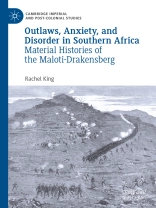This book explores how objects, landscapes, and architecture were at the heart of how people imagined outlaws and disorder in colonial southern Africa. Drawing on evidence from several disciplines, it chronicles how cattle raiders were created, pursued, and controlled, and how modern scholarship strives to reconstruct pasts of disruption and deviance. Through a series of vignettes, Rachel King uses excavated material, rock art, archival texts, and object collections to explore different facets of how disorderly figures were shaped through impressions of places and material culture as much as actual transgression. Addressing themes from mobility to wilderness, historiography to violence, resistance to development, King details the world that raiders made over the last two centuries in southern Africa while also critiquing scholars’ tools for describing this world. Offering inter-disciplinary perspectives on the past in Africa’s southernmost mountains, this book grapples with conceptsrelevant to those interested in rule-breakers and rule-makers, both in Africa and the wider world.
Tabla de materias
1 Introduction: The slow regard of unruly things.- 2 ‘Waste-howling wilderness’: The Maloti-Drakensberg as unruly landscape.- 3 ‘Were they half civilized?’ Knowledge and reminiscence in the Maloti-Drakensberg.- 4 Unsettled encounters; Or, if walls Could Speak about.- 5 ‘Appetite comes with eating’: Of raiding and wrongdoing.- 6 Persist, resist: Rebellion in Slow-Motion.- 7 Things of the nation: Disorderly heritage.- 8 Conclusion.
Sobre el autor
Rachel King is Lecturer in Cultural Heritage Studies at the Institute of Archaeology, University College London, UK. She holds degrees in archaeology from Stanford University, US, and the University of Oxford, UK, and has held a Smuts Research Fellowship in African Studies at the University of Cambridge, UK, and a Claude Leon Post-Doctoral Fellowship at the University of the Witwatersrand, South Africa. Her work has been published in Africa, Archaeological Dialogues, History and Anthropology and the Journal of African History, among other journals.












